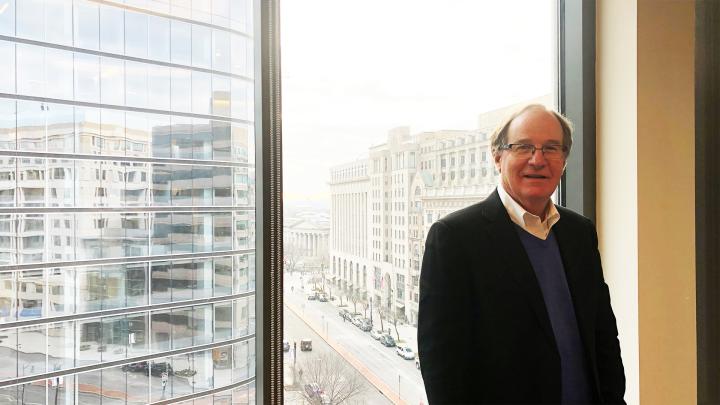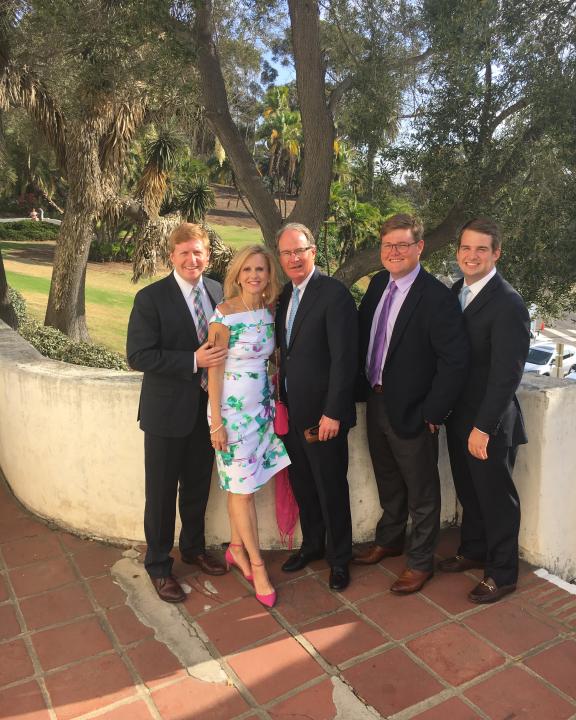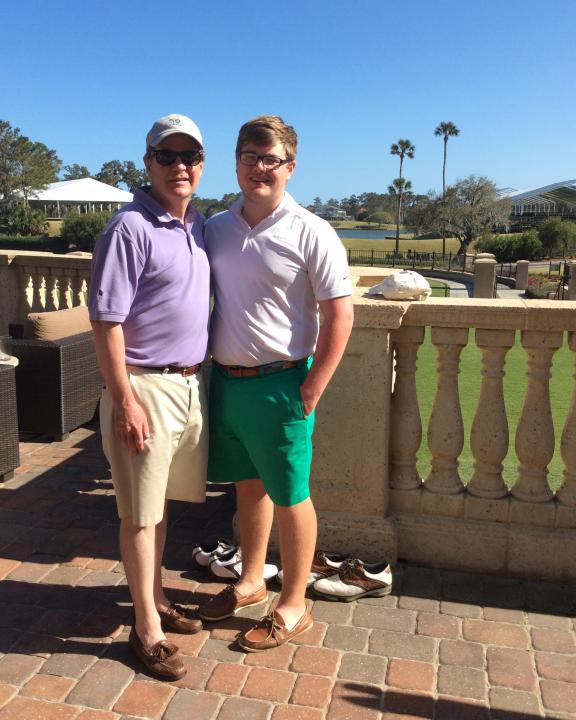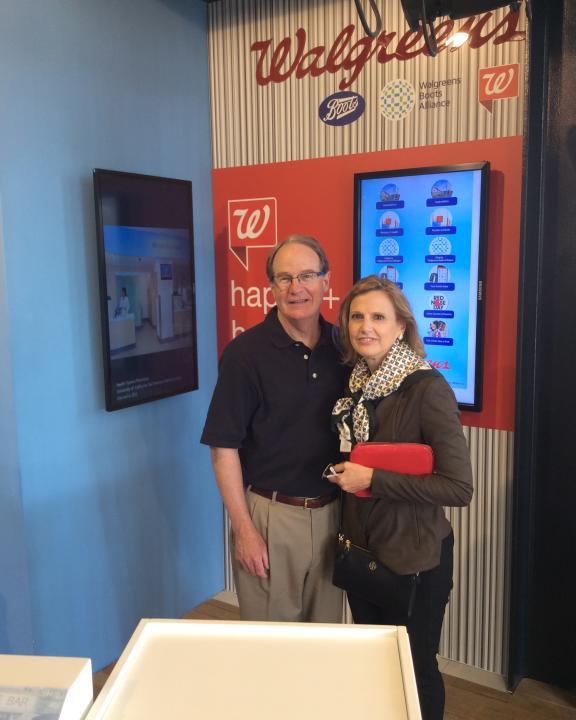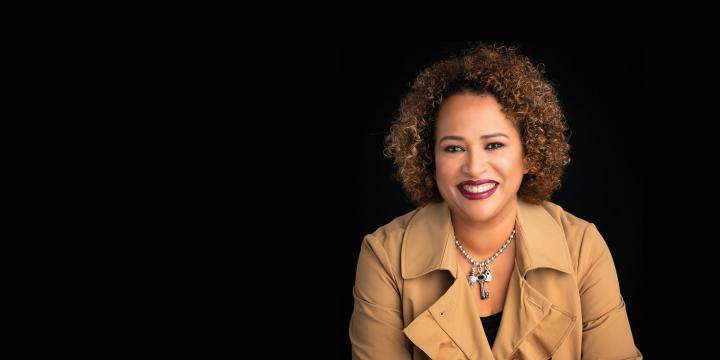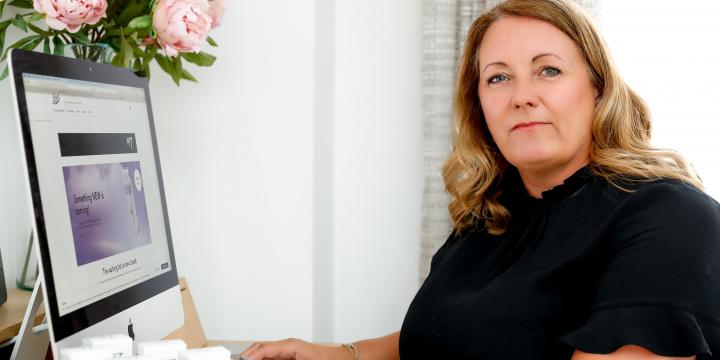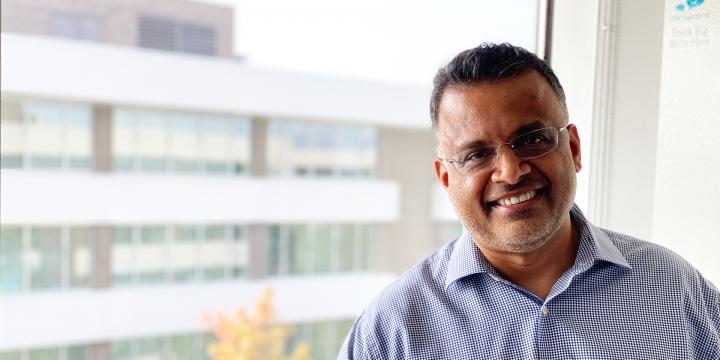THE BASICS
Name: Chuck Greener
Role: Senior vice president, global chief public affairs officer
Born in: Aguadilla, Puerto Rico, at the Ramey Air Force Base
Family: Wife, Lisa; and four children, Kristy, Joey, Charlie, and Sam
THE ICEBREAKERS
- Has been with WBA (and Walgreens) since January 2010
- Previously the senior vice president for Global Communications and Corporate Affairs of Walgreens Boots Alliance. Has also held several positions for Fannie Mae in Washington, D.C., ultimately serving as chief communications and marketing officer, and chief of staff to the CEO, and was regional director and general manager of Porter Novelli in Washington, D.C.
- Fast facts:
- Growing up, Greener spoke Spanish before speaking English (and can still converse in it today).
- Knows the ins and outs of the U.S. Capitol building and can take you on a tour of the Crypt, the room directly beneath the Capitol Rotunda. There, he can show you the rare sight of all the bedding for those who have lain in state, including the late Justice Ruth Bader Ginsburg and President John F. Kennedy.
- Worked in the White House from 1987-88 as part of the Office of Legislative Affairs, which is responsible for advancing the President's legislative agenda on Capitol Hill. In 1988, Greener flew on Air Force One for President Reagan’s final trip to South Bend, Ind., where Reagan reprised the famous “Win One for the Gipper” speech by Knute Rockne, Notre Dame’s legendary football coach.
Can you describe your position as WBA’s first global chief public affairs officer?
As we’ve seen over the last decade, government is playing a bigger role across healthcare and in business, both in the U.S. and internationally. Given this development, WBA has enhanced its government relations team at the local, state and federal levels and created my role to further support the work we are doing industry wide.
Looking at the broader trends, this is really WBA’s moment. Pharmacy is more front and center in terms of healthcare than ever before. Our ability to demonstrate what we can do to provide accessible, quality care through the delivery of COVID-19 testing to millions in the U.S. and UK – and now scaling up to deliver the vaccine in the U.S. to long-term care facilities and then to the general public – is critical.
Our pharmacy teams are truly practicing at the top of their licenses. From H1N1 to the flu, as well as providing a number of other clinical services, our pharmacists and technicians have always done tremendous things when asked to play a critical role, and we are now equally as confident to support our customers and patients. Our team is here to gain further recognition and support for that work from governing bodies at all levels.
Is there a “typical” day for you working with governments to advance the future of healthcare and retail for WBA’s customers, patients and partners?
A typical day? [laughs] No, there really is no typical day, which is a great thing in that our work is always challenging and new. Although this team has a lot of collective experience within WBA, we recently formed to focus primarily on the U.S., but are also looking at our global footprint to see where we can make an impact.
Ultimately, our team is helping to advance the role of pharmacy and retail through education and advocacy. We always ask how we can help others understand WBA’s role in the local communities where we serve. Every day, there are problems we need to solve with public officials and the organizations we work with, such as the National Association of Chain Drug Stores, Retail Industry Leaders Association, Business Roundtable and other conference boards. We also work with other community organizations, such as the Urban League, NAACP and the Congressional Hispanic Caucus here in Washington, D.C.
And I would be remiss if I didn’t acknowledge the work of my talented team. Ed Kaleta, vice president of U.S. government relations, is one of the best professionals I have ever worked with, and he has an outstanding team led by Casey Cesnovar, who heads state government relations; Alethia Jackson, who heads federal government relations; and Steven Gregory, who heads U.S. public policy for WBA. It is also a pleasure to work alongside Tricia Kennerley and her outstanding team in the UK. Like the team here in the U.S., they have been in the middle of working with the UK government, and other governments across Europe, to address this historic pandemic. Overall, we are one team working in support of WBA’s efforts to advance pharmacy and retail.
What’s something you think people should know before going into a career in public affairs/government relations?
We are truly a service-minded team. By definition, someone in this role must have strong people skills and be a problem solver. We are always presented with unique challenges, so that requires internal and external collaboration. Issues will come up, and we need to rely on our business partners to be successful in getting information to the right people at the right time.
It’s also critical someone in this role understands how government intersects with our business. The U.S. government, via the Centers for Medicare & Medicaid Services (CMS), is the single largest payer for healthcare. With all the plans we partner with, if CMS makes a decision or a change, we need to know how it will impact WBA on the healthcare side. On the retail side, organized retail crime in the communities we are in poses a serious threat, as do trade agreements that impact taxes and tariffs on products we source from overseas. We are regularly working with governments at the local, state and federal level to address all the issues impacting us.
With WBA’s DNA as a pharmacy-led company, how do you see us leveraging our expertise and footprint to help accelerate safe access to COVID vaccines? Do those governmental relationships help?
From the beginning of the pandemic in March, the White House and other governmental agencies, such as the Department of Health and Human Services (HHS), immediately reached out to ask for our assistance in administering COVID-19 testing across the U.S. We also partnered with the NHS on testing in the UK.
That public-private partnership between federal and state governments and businesses like ours allowed us to build our testing program. In fact, we will have helped test millions of people for COVID-19 in the U.S. and in the UK by the end of the year, with prioritized efforts on improving access to testing in underserved communities. Through the last nine months, our teams in our stores have demonstrated how fast and how responsibly pharmacy can deal with a crisis of this nature.
Today, we are a key part of Operation Warp Speed to provide and administer COVID-19 vaccines. In fact, just recently, Gen. Gustave Perna, who’s leading Operation Warp Speed, attended a presentation on our readiness plans in administering COVID-19 vaccines at our corporate headquarters in Deerfield, Ill. He commented afterward our presentation was very well done, which speaks to the amazing collective effort of our teams on the ground and behind the scenes. We have worked truly nonstop, seven days a week, since March to be ready for this moment and the important role we will play in the biggest vaccine coordination in Walgreens history. We are in constant contact with the HHS, Centers for Disease Control and Prevention, the White House and at times the Food and Drug Administration (FDA), and making sure everyone in the Senate and House know everything we’re doing. It’s a total team effort coast to coast.
With your background working on several U.S. presidential campaign trails, do you have any interesting stories from the road?
I graduated from Valparaiso University in Indiana in 1976 with a double major in history and political science, so that was the first presidential campaign I worked on with the Republican National Committee. In fact, the first thing I was ever asked to do out of college was research an unknown governor in Georgia, Jimmy Carter, who no one thought would even win the nomination. I was 22, and once he won Iowa and subsequent state primaries, I was one of two people who had any type of opposition research. I was invited to the White House to give a briefing to the head of their political operations team and President Ford’s deputy chief of staff about who he was and what he stood for. With so much in life, it comes down to fortune, and that’s how my career in politics truly began.
Family means the world to Chuck, so check out five photos of his loving family of six: his wife, Lisa; and four children, Kristy, Joey, Charlie, and Sam:
Where did that passion for history and politics come from?
The truth is that I am one of five children, and my father served in the military for 22 years. When he retired from his service, he then went into government, serving as President Ford’s assistant press secretary. Then, in 1976, he was Ford’s campaign communications director. So politics and government were always part of my life. In fact, at the dinner table growing up, my mom would always say, “Pick your topic, pick your side and the debate will begin.”
I hear you’re an avid reader. What’s on your nightstand now, and what books stuck out in 2020?
Currently, you’ll find “All the Light We Cannot See” by Anthony Doerr on my nightstand, which is a novel set in France during World War II. Two standouts for the year are the James Baker biography, “The Man Who Ran Washington,” by Peter Baker and Susan Glasser, as well as John Meacham’s biography on George H. W. Bush, “Destiny and Power.”
You were a former member of the board of trustees of the National Childhood Cancer Foundation and the Children’s National Medical Center. What inspired that passion?
It’s a personal story. My wife, Lisa, and I have four children. When our middle son, Charlie, was 4, he was diagnosed with Burkitt’s lymphoma and was in the Children’s National Hospital in Washington, D.C., for eight months. At the time, we had a 6-year-old and my wife was pregnant with our youngest. The medical center staff turned out to be an absolutely phenomenal team, and we are forever grateful. Day in and day out, what they and every children’s hospital staff do makes us very passionate about supporting this cause. If you ever have an ill child, and there is a children’s medical center in your community, please use it. Charlie is now 26 and a teacher and football coach, so we love watching him continue to grow.
You’ve worked in both the Deerfield, Ill., and Washington, D.C., offices in your time with Walgreens and WBA. Which city has better food?
That’s a tough, tough question. You simply cannot beat Chicago for steakhouses. What I also loved about living in the Chicagoland area for years is that it’s not just downtown, but you can find great restaurants anywhere in both the city and suburbs. D.C. is a totally different beast, but it does have some excellent French restaurants. However, I’ve lived in D.C. most of my life and love sharing the city with those who come to visit.
Lastly, what are your New Year's resolutions for 2021?
I have a few. My wife and I have been involved with our church, so we’d like to do more service locally to help feed the homeless and support other families in need in the community. Also, I’m a political and history junkie, so I’d like to expand and read about new and different topics. I also say it often, but I would really like to improve my golf game. Lastly, family is extremely important to me, so I’d love to spend more time with our four grandchildren, who are 11, 7, 5 and 4. It has been hard during the pandemic to be away from them, but we do FaceTime every week, so I have at least been able to see them a lot.

